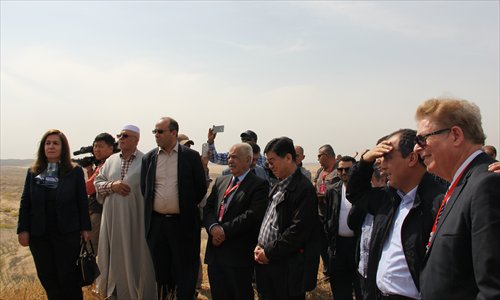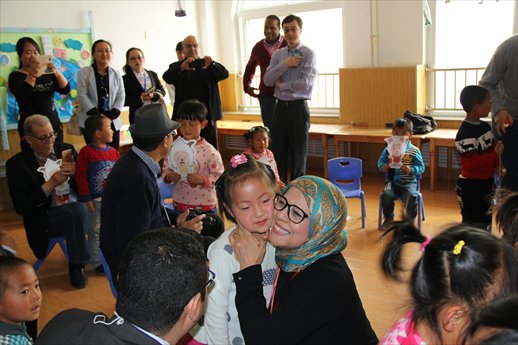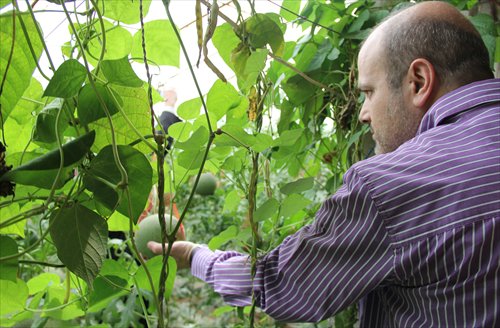Boasting affinity with Arab world, Ningxia cherishes Belt and Road ambitions
Linked by shared culture and beliefs, Ningxia, home to many of China's Hui Muslim ethnic minority, has been eager to increase its links with Arab nations and encourage Middle Eastern businessmen to come to the region to take advantage of the opportunities on offer. The government hopes the region will be a bridge between China and Arab countries, while experts have warned that the country should be alert to the infiltration of religious extremism."

Arab delegates visit a sand-fixation area in Lingwu, the Ningxia Hui Autonomous Region. Photo: Yue Feifei
A hinterland village in the Northwest China's Ningxia Hui Autonomous Region hosted a group of foreigners in gowns or suits last month. This diverse group were not tourists, but politicians from Arab countries.
The locals didn't feel they were strange but felt a connection with these Middle Eastern visitors. The residents, mostly from China's minority Hui Muslim ethnic group, crowded around and some even asked for selfies. Many Hui believe that they are descended from Arab merchants who came to China from the 7th century onwards.
The Arab representatives were taking a tour of Heshun New village under Ningxia's capital city Yinchuan.
The politicians from 16 Arab countries were shown around and told how the local government had relocated 750 poor households and alleviated poverty in the area, according to the village secretary Li Xiaofeng.
It's not the first time the village has been visited by Arab guests. "I have received foreign delegates more than 20 times. Our village is a pilot in poverty alleviation in Ningxia and we promote integration between Han and Hui in daily work," said Li.
Aside from Heshun, the whole Ningxia region has its extended exchanges with the Arab countries. Thanks to their shared culture, Ningxia has become a window for "One Belt and One Road" initiatives, for China and Arab countries to seek cooperation and development.

Arab delegates visit a village kindergarten in Yinchuan, Ningxia. Photo: Yue Feifei
Work together
"As the only Hui autonomous region, Ningxia has advantages in communicating with Arab states and Muslim countries based on their shared beliefs and culture," Liu Ying, a research fellow at the Chongyang Institute for Financial Studies of the Renmin University of China, told the Global Times.
According to 2015 statistics from the regional government, there are 2.4 million Muslims living in Ningxia, accounting for 36 percent of the region's population.
Liu said that Ningxia could act as a bridge to help China work with these countries in many fields, including infrastructure, financing and personnel exchanges.
The delegates Li received in April are representatives from more than 30 political parties from 16 Middle-Eastern countries, who came to China and visited villages and deserts in the nation's western hinterland.
The political parties included both ruling parties and opposition parties, both old and new, with contrasting political views.
Zhang Jianwei, deputy head of the Communist Party of China (CPC)'s West Asian and North African affairs bureau, told media that the visit was to implement an initiative President Xi Jinping announced to the Arab League in January, in which 1,500 members of Arab political parties will be invited to visit China.
During the visit, delegates discussed subjects including "Path Selection and Political Leading," "Peace and Stability and International Anti-Terrorism," and "One Belt and One Road and the Role of Political Parties."
Aside from these discussions, delegates visited several places in Ningxia, including Heshun, a sand-fixation area in Lingwu and a Hui ethnic minority community in Yongning.
When these delegates stood in a sand-fixation area in Baijitan, they asked a battery of questions - "what is the annual rainfall here?" ""How do you irrigate the area?" and "Have animals come after plants started to grow here? "
The delegates learnt from their guides that the residents use straw checkerboards - a dune fixation technique in which straw is placed on the desert surface in the shape of a checkerboard - to make a 42-kilometer-long and 10-kilometer-wide green barrier to stop the desert from moving west.
A delegate from the Free Egyptians Party, gave praise to local people after learning that all the boards were put there by residents, according to "bqzhengzhiju," a WeChat account affiliated to the Beijing Youth Daily.
Essam Sharaf, a former Eygptian premier who attended the dialogue's opening ceremony, was quoted as saying that the tremendous achievements and rich experience of the CPC have inspired and set an example for other political parties around the world.
"These politicians could get a complete picture of China during their visits to Ningxia and other less-developed regions in Northwest China. The economic achievements that came from implementing the CPC's policies in these areas are more convincing than any publicity," said Xie.
Li said that the delegates were impressed when they were told that the Heshun government relocated residents from barren mountainous areas to 544 newly-built apartments, completed infrastructure projects and increased employment.

An Arab delegate visits a greenhouse in Heshun, Ningxia. Photo: Yue Feifei
Unique position
Xie Chuntao, a professor with the Party School of the CPC Central Committee who was invited to attend the dialogue, explained to the Arab representatives how the CPC formulates Five-Year-Plans to guide China's development and why regular leadership transitions help push forward stable policies.
Xie told the Global Times that such inter-party exchanges could dispel misunderstandings and help parties from Arab countries better understand China's policies, especially the Belt and Road initiatives.
Zhou Xiaojing, vice director of the Institute of Asian and African Development Studies under the State Council Development Research Center, told the Global Times that these exchanges are a good opportunity for China to drum up support from different parties in Arab countries to promote the Belt and Road initiative as well as play a role in post-war reconstruction.
"Ningxia is located on the New Eurasian continental bridge and has been a significant pivot on the Silk Road," Liu said.
Liu said that the Belt and Road initiative highlights Ningxia's regional advantage, making it the frontier for inland opening-up since it also plays a significant role in China's western region development strategy.
Some inland regions like Ningxia have developed fairly complete industrial niches which could be an example of how to improve the resource extraction-based economies of some Arab countries, said Liu.
In a keynote speech at the Arab League Headquarters in Cairo in January, President Xi Jinping said that China has entered into strategic partnerships with eight Arab states and signed agreements with six other Arab states on jointly developing the Belt and Road Initiative. Seven Arab states have become founding members of the Beijing-led Asian Infrastructure Investment Bank.
Li Jianhua, Party Secretary of Ningxia and chairman of the Standing Committee of the Ningxia People's Congress said in an interview with China Central Television (CCTV) in March that the region has been actively engaged in reaching out to Arab nations.
According to CCTV News, Ningxia signed deals for 241 projects and 183 billion yuan ($28 billion) of contracts at the second China-Arab States Expo in 2015 and there are five bilateral cooperation institutions set to be built in Ningxia, covering technological, commercial, agricultural and medical fields.
And the construction of the "China-Saudi Arabia Industrial Park" in the Saudi city of Jazan and the "China-Oman Industrial park" in Duqm,Oman are new platforms for China-Arab cooperation, said the report.
Stay alert
However, as one of China's least-developed regions, Ningxia is facing several hurdles to reaching its ambitious goal, including its poor infrastructure, said Liu.
Liu added that there are no high-speed rails links to Yinchuan, capital city of Ningxia, which hinders its connections to more-developed coastal regions.
According to its official website, Yinchuan Hedong International Airport now offers 59 domestic routes and five international routes to some Asian countries, including Seoul in South Korea and Osaka in Japan.
Xi'an Xianyang International Airport in Ningxia's neighboring Shaanxi Province offers a total of 269 domestic and international routes.
According to Li Jianhua, Ningxia is now making efforts to build the "Land Silk Road" - rail-to-road and rail-to-sea combined transportation - and the "Air Silk Road" - a total of 11 air routes to cities, including Dubai and Incheon.
Emirates launched a new service from Dubai to Yinchuan and Zhengzhou, Henan Province, on May 3, expanding Emirates' mainland destinations to five, including Beijing, Shanghai, and Guangzhou.
In a press release, Chairman and Chief Executive of Emirates, Sheikh Ahmed bin Saeed Al Maktoum, was quoted as saying that the new transport links will help boost trade and tourism in central and western parts of China.
During exchanges with Arab countries, Ningxia should also stay alert to the flow of Islamic extremism, a Beijing-based expert who asks for anonymity told the Global Times.
The expert said that some Arab countries and other Muslim countries have been troubled by religious extremism and safety assessments are needed before launching Chinese enterprises there or having personnel exchanges.
"Both China and Arab countries should be aware that cooperation should be based on independence, non-interference in each other's internal affairs and mutual respect to each side's culture," said the expert.
The expert added that since poverty alleviation is the best way to eliminate religious extremism and terrorism, Ningxia could also share its experience and efforts with some Muslim countries.
In his Cairo speech, President Xi called for joint efforts from the Arab states in fighting terrorism since "the spread of terrorist and extremist ideas poses a serious challenge to peace and development" and it "shall not be linked with any specific ethnic group or religion, as it will only create ethnic and religious tensions."
Xi said that "no policy can be effective on its own, and a comprehensive strategy that addresses both symptoms and root causes must be applied in the fight against terrorism."
Newspaper headline: Islamic guanxi